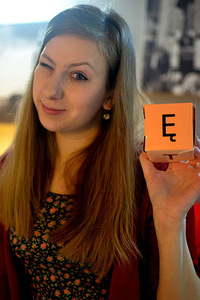Neringa Butnoriūtė "I am frightened by the reticence of literary scholars" 0
In brief: Neringa Butnoriūtė is an active player in the literary field. Her name is usually mentioned when talking about the latest Lithuanian book reviews; she is doing a PhD in literature and a frequent participant in cultural events. This time we are talking about young writers and a festival dedicated to them "Literary Slips", which was partially organized by the interlocutor.
"I am delighted that the name of the festival had lost the word... Vilnius. Since you also called it simply "Slips." It is not really our merit, but rather a natural and most welcome development. I am not inclined to divide literature into regions, although looking at them we would be able to see some derivatives, circles. Still, a good creator does not necessarily identify herself with a certain denominator. Firstly, she speaks for an individual reader.
“I have been reading the festival almanacs for years and I was concerned that there was no clear status of a participant. This year we tried to purify it, at least while selecting the authors.
"Of course, slip requires distance. I mostly want to see it among the former participants and to look for diversity, to include the people, who have been active in a literary field in recent years, but who are seldom mentioned, such as T. Zaronskis, V. Grainytė. In my opinion, "Literary slips" should be and is a capable platform, which reveals relevant processes, belonging to the contemporary literary landscape,” says Dovilė Butnoriūtė.
I was wondering what Dovilė thinks about the idea of creative writing being taught in university departments of literature.
According to D. Butnoriūtė such lectures are educating and helping to relax from academic thinking; with a mild violence suggesting to think about different, sometimes unexpected structures. "I recently learned that, for example, master students of art curation in Kaunas have such lectures and I think that this class is not assessed in points. I agree with this approach and the assignment of creative writing not only to philology, although it would not hurt the philology students.
"I doubt that this is how the writers are born though. If so, then is it only they? After all, creative writing may include learning how to write a creative artwork, performance, happening review or even learning how to debate with other texts. The ones who wish to become writers can view academic literary circles just as important. There - people who feel the creative impulse and are nurturing a desire to shine can be found."
I wondered if Dovilė Butnoriūtė would agree with the statement that the bohemian writers and their destructive life that prospered during the Soviet times had seized to exist and they were changed by the writers who do not romanticize their work.
Dovilė Butnoriūtė says "It is an interesting question. I do not know whether the concept of bohemianism is still important and whether it exists, but various sources recently were telling me that the bohemianism of the writers was a bit confectionery. After taking to the median generation, it seems, that the wheel turns and people talk more about the caffeine foodies rather than alcohol. It can take away half of the charm or add as much.
Today the variety of gathering spaces and topics is bigger: politics, history, economics that has not been taken away from the writers, they don't have to focus only on the life within their own country, turn to culture as a possibility of another world and speak about it through their texts to others. The gatherings are more casual, more open, therefore I do not consider partying, between my writer peers as a bohemian stance. It is neither romantic nor not. Simply normal."









